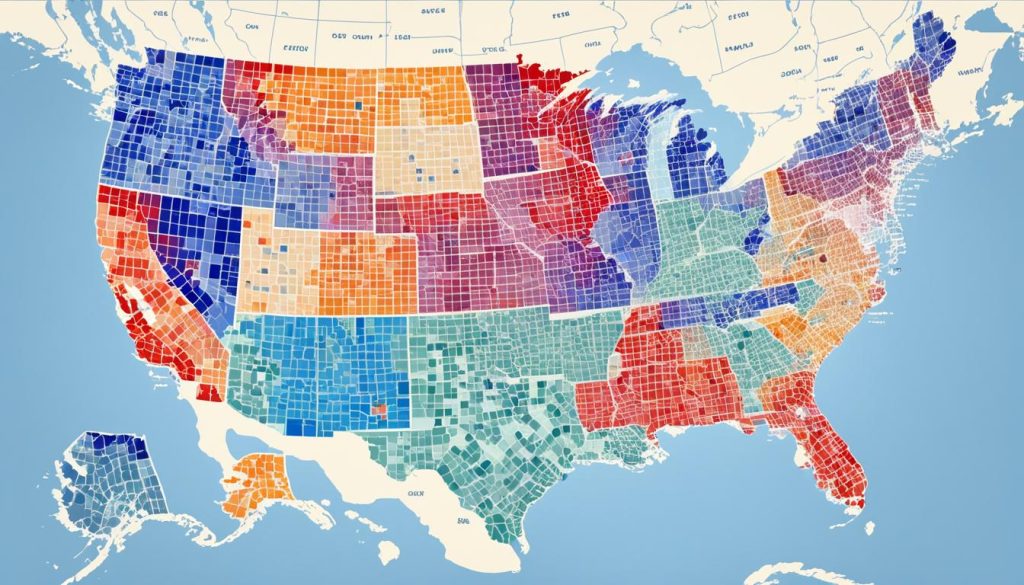Are you curious about what police officers in Canada earn? The answer may surprise you. On average, a police officer’s salary in Canada is approximately USD 71,900 per year. But that’s just the tip of the iceberg. Factors such as location, experience, and rank can greatly influence a police officer’s pay scale, resulting in a wide range of earnings.
Key Takeaways:
- On average, police officers in Canada earn around USD 71,900 per year.
- Salaries can range from USD 61,100 to USD 82,700 based on factors like location, experience, and rank.
- Approximately 75% of police officers earn USD 83,600 or less annually.
- The minimum salary for a police officer in Canada is USD 61,100.
- The salary range for police officers falls between USD 61,100 and USD 82,700.
Factors Affecting Police Officer Salary
Several factors play a role in determining the salary of a police officer in Canada. These factors include geographical location, years of experience, specialty area and qualifications, and ranks and promotions.
Geographical Location: The cost of living varies across different regions in Canada, and this directly impacts the salaries offered to police officers. Generally, higher cost of living areas tend to offer higher salaries.
Years of Experience: The pay scale for police officers can increase as they gain more experience in the field. Officers with additional years of experience often receive incremental raises and advancements in their careers.
Specialty Area and Qualifications: Specialized skills, certifications, and advanced degrees can contribute to higher earning potential for police officers. Obtaining additional qualifications in areas such as forensics, cybercrime, or negotiation tactics can lead to higher salaries.
Ranks and Promotions: Advancing in ranks within the police department is another factor that can affect the salary of a police officer. As officers progress in their careers and assume higher positions, they typically receive higher pay rates.

| Factors | Impact on Salary |
|---|---|
| Geographical Location | Higher cost of living areas generally offer higher salaries for police officers. |
| Years of Experience | Officers gain incremental raises and advancements as they accumulate more experience. |
| Specialty Area and Qualifications | Specialized skills, certifications, and advanced degrees can contribute to higher earning potential. |
| Ranks and Promotions | Advancing in ranks within the police department typically leads to higher pay rates. |
Regional Differences in Police Officer Salaries
When it comes to police officer salaries, there are significant regional differences across Canada. The average annual wages for law enforcement officers can vary greatly from one state to another. Let’s take a closer look at some of these regional variations.
Highest Average Salaries
When it comes to the highest average salaries for police officers, the state of California takes the lead. Law enforcement officers in California earn an average annual wage of USD 104,010. Other states where police officers enjoy high average salaries include Washington, New Jersey, Hawaii, and Alaska.
Lowest Average Salaries
On the other end of the spectrum, there are states where law enforcement officers earn lower average salaries. Mississippi, Arkansas, Kentucky, West Virginia, and Tennessee are among the states with lower average salaries for police officers. These variations can be attributed to the unique economic conditions and cost of living in each region.
It is important to consider these regional differences when evaluating police officer salaries and understanding how they relate to the specific geographical areas in which law enforcement officers work.
| State | Average Annual Wage |
|---|---|
| California | USD 104,010 |
| Washington | USD XX,XXX |
| New Jersey | USD XX,XXX |
| Hawaii | USD XX,XXX |
| Alaska | USD XX,XXX |
| Mississippi | USD XX,XXX |
| Arkansas | USD XX,XXX |
| Kentucky | USD XX,XXX |
| West Virginia | USD XX,XXX |
| Tennessee | USD XX,XXX |

Understanding the regional differences in police officer salaries is crucial for both individuals aspiring to join the law enforcement profession and current law enforcement officers who may be considering a relocation or job change. It is important to research and consider the average salaries in a specific region in order to make informed decisions about career opportunities and future earning potential.
Impact of Education on Police Officer Salary
Earning a college degree can have a significant impact on a police officer’s salary and career advancement opportunities. Many police departments in Canada require or prefer candidates with an associate or bachelor’s degree. Higher education not only provides officers with a solid foundation of knowledge but also positions them for higher pay grades.
Obtaining advanced degrees, such as a master’s or doctorate, in fields like criminal justice or public administration can open doors to specialized roles and higher salaries. Advanced education equips officers with the skills and expertise needed to excel in leadership positions within the law enforcement profession.
Here is an overview of the potential salary increase associated with higher education:
| Degree Level | Potential Salary Increase |
|---|---|
| Associate’s Degree | Up to 10% increase |
| Bachelor’s Degree | Up to 20% increase |
| Master’s Degree | Up to 30% increase |
| Doctorate Degree | Up to 40% increase |
While a college degree alone can lead to higher salaries, it can also open doors to career advancement opportunities. Higher ranks within the police department often require candidates to possess a bachelor’s degree or higher. By pursuing higher education, officers can position themselves for promotions and increased responsibility, which often come with higher pay scales.
Investing in education not only benefits individual officers but also strengthens the entire law enforcement community. With a well-educated and skilled workforce, police departments can better serve their communities and tackle complex challenges effectively.
Benefits and Compensation for Police Officers
Being a police officer comes with more than just a salary. Police officers also receive a comprehensive benefits package that ensures their well-being and the security of their families. These benefits and compensation packages play a crucial role in providing support and peace of mind to those who serve and protect our communities.
One of the key benefits that police officers enjoy is access to health and life insurance coverage. This coverage helps safeguard their physical and financial well-being, providing peace of mind in case of any unforeseen circumstances. It ensures that officers have access to quality healthcare and support for their loved ones.
Additionally, police officers are entitled to vacation and sick leave, allowing them to take time off when needed. This time off is essential for rest and recuperation, as well as maintaining a healthy work-life balance. It enables officers to recharge and come back to their duties refreshed and ready to serve their communities.
Retirement plans are another essential component of the benefits and compensation packages for police officers. These plans help ensure financial security and stability after years of dedicated service. Having a well-structured retirement plan allows officers to plan for their future and enjoy their retirement years without financial worries.
Overall, the benefits and compensation packages for police officers go beyond just a salary. They provide support, protection, and peace of mind to those who put their lives on the line for the safety and well-being of others. These benefits are an acknowledgment of the sacrifices that police officers make every day and serve as an incentive to attract and retain talented individuals within the law enforcement community.
Pay by Experience Level for Police Officers
When it comes to police officer salaries, experience plays a crucial role. As officers progress in their careers, their pay tends to increase. Let’s take a closer look at the pay structure based on different experience levels:
-
Entry-Level: Officers with less than 1 year of experience can expect an average total compensation of USD 50,360.
-
Early Career: Officers with 1-4 years of experience earn an average total compensation of USD 66,259.
-
Mid-Career: As officers gain more experience and skills, their pay tends to rise. Mid-career officers can see increased earnings and better benefits.
-
Late Career: Officers in the late stages of their careers, with significant experience behind them, typically earn higher salaries and enjoy additional perks.
-
Experienced: The most experienced officers, often with specialized skills and qualifications, can enjoy higher salaries and lucrative career opportunities.
How Can Police Officers Increase Their Salary?
To increase their salary, police officers have several avenues to explore. Firstly, considering a change of employer can be a strategic move to secure higher pay for their valuable skills and experience. By researching and applying to police departments or organizations that offer better salaries, officers can potentially see a significant increase in their earnings.
Another effective way to boost income is by investing in higher education. Pursuing advanced degrees or certifications, such as a Master’s in Criminal Justice or specialized training in areas like forensic science, can lead to salary increases within the law enforcement field. Many police departments value continuous education and reward officers who take the initiative to enhance their knowledge and qualifications.
Furthermore, honing their managing experience and gaining expertise in specific areas can also contribute to a higher earning potential. Police officers who develop specialized skills, such as hostage negotiation or cybercrime investigation, often become highly sought-after assets in their departments, which can result in better compensation packages.
Advancing through the ranks within the police department is yet another path to a higher salary. Police officers who consistently demonstrate strong performance, leadership, and dedication may be promoted to higher positions, such as sergeant, lieutenant, or captain. Each promotion typically comes with an increase in salary and additional perks, reflecting the increased responsibilities and authority held by these officers.